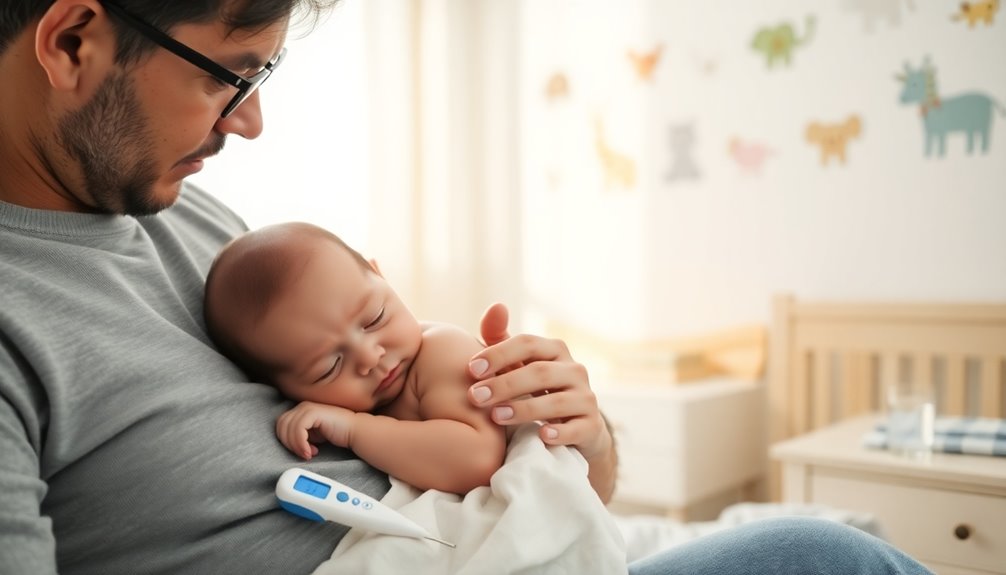When your baby has a fever, it's important to act quickly. For babies under three months, any temperature over 100.4°F needs immediate medical help. For older babies, keep them hydrated, dress them lightly, and consider lukewarm sponge baths. Acetaminophen or ibuprofen can help if prescribed, but only for babies over three months and with advice from a doctor. Staying aware of symptoms and temperature patterns can make a big difference. You'll want to know more about effective monitoring and management strategies.
Key Takeaways
- Use lukewarm sponge baths to help lower the baby's temperature, but stop if shivering occurs.
- Ensure the baby stays well-hydrated to prevent dehydration during fever.
- Dress the baby in lightweight clothing and maintain a cool room temperature.
- For babies over 3 months, consider administering acetaminophen or ibuprofen as directed for fever relief.
- Monitor the fever closely and consult a doctor if it lasts more than 24 hours or exceeds 104°F.
When Is a Fever Too High for a Baby?

When should you be concerned about a fever in your baby?
If your infant is under 3 months old and has a body temperature exceeding 100.4°F (38°C), seek medical attention immediately.
For babies aged 3 to 6 months, a rectal temperature of 102°F (38.9°C) or higher, especially with irritability or lethargy, requires a doctor's visit.
If your child is between 6 to 24 months old and has a fever over 102°F lasting more than 24 hours, it's time for evaluation.
Any fever that reaches 104°F (40°C) in children of any age needs prompt medical care.
Persistent fever lasting more than 72 hours in kids over 2 should be assessed to rule out an underlying cause, possibly even a trip to the emergency room.
How to Reduce Your Baby's Fever

If your baby has a fever, knowing how to manage it effectively can provide comfort and relief. Here are some tips to help reduce a fever:
- Give a lukewarm sponge bath to help lower their temperature, but stop if shivering occurs.
- Keep your baby well-hydrated by encouraging fluid intake to prevent dehydration.
- Dress your baby in lightweight clothing and maintain a cool room temperature for comfort.
- If your baby is over 3 months old, consider giving acetaminophen or ibuprofen as directed by their age and weight.
- Monitor your baby's fever closely; if it lasts more than 24 hours for those under 2 years old, or exceeds 104°F at any age, consult a doctor for further evaluation.
When to Give Your Baby Medicine for Fever Symptoms

Knowing when to give your baby medicine for fever symptoms can be vital for their comfort and recovery. If your baby shows signs of discomfort, like irritability or trouble sleeping, consider administering fever reducers such as acetaminophen.
It's important to consult a healthcare professional before giving any medication, especially to infants under 2 years old. Make sure you follow the dosage instructions based on your baby's age and weight to avoid underdosing or overdosing.
Only give medication if the fever exceeds 102°F (38.9°C) and lasts longer than a day, particularly in babies aged 6 to 24 months. Monitoring your baby's symptoms and documenting any fever patterns can also help in future medical consultations.
Important Monitoring Tips for Parents

How can you guarantee your baby's fever is monitored effectively? Keeping a close eye on your infant's condition is essential. Here are some important tips:
Monitoring your baby's fever is crucial; stay vigilant and follow key tips for effective care.
- Use a digital multiuse thermometer for accurate temperature readings, especially rectally.
- Regularly check for significant symptoms like irritability, lethargy, or dehydration.
- Document fever patterns, noting temperature readings and any accompanying symptoms.
- Monitor the duration of the fever; call a doctor if it lasts more than 24 hours in infants.
- Assess the effectiveness of any home treatment by tracking changes in temperature.
Related Products and Resources for Fever Management

When your baby has a fever, having the right products and resources at hand can make a significant difference in managing their comfort and health.
For fever relief, consider infants and young children's TYLENOL® or MOTRIN® products, but always consult a doctor before administering any medication to kids under 2.
Accurate temperature measurement is essential, so use a digital multiuse thermometer for precise readings.
Keep your baby comfortable during fever with lightweight clothing to help regulate their temperature.
Additionally, hydration solutions like electrolyte drinks can be critical to maintain fluid intake and prevent dehydration.
Frequently Asked Questions
How Can I Lower My Baby's Fever Quickly?
To lower your baby's fever quickly, start with a lukewarm sponge bath to help cool them down.
Make sure they stay hydrated by offering plenty of fluids.
Dress them in lightweight clothing and keep the room cool.
If your baby seems uncomfortable, you can consider giving acetaminophen or ibuprofen, but check with a doctor first if they're under three months.
Regularly monitor their temperature and note any additional symptoms for further advice.
What Is the Instant Solution of Fever?
The instant solution for reducing your baby's fever involves a few key steps.
You can give age-appropriate fever-reducing medications like acetaminophen or ibuprofen.
A lukewarm sponge bath may help, but stop if your baby shivers.
Keep your baby hydrated by encouraging fluids, and dress them in lightweight clothing.
Maintain a cooler room temperature for comfort, and monitor their temperature regularly to watch for any concerning symptoms that might require medical attention.
When to Take Baby to the ER for Fever?
When your baby has a fever, you should take them to the ER if they're under three months and their temperature hits 100.4°F (38°C) or higher.
If their fever exceeds 104°F (40°C), or if they show severe symptoms like persistent crying or shaking chills, don't hesitate to seek help.
Also, look for signs of dehydration or unusual lethargy, difficulty breathing, or seizures—those indicate immediate medical attention is necessary.
Should I Let My Baby's Fever Run Its Course?
Imagine a tree weathering a storm, standing strong while the winds howl.
Your baby's fever can be similar; it's a natural defense against infection. If their fever's below 102°F and they seem comfortable, it's often best to let it run its course.
Keep an eye on their overall condition, ensuring they stay hydrated. However, don't hesitate to seek medical help if the fever spikes or lasts too long.
Trust your instincts!
Conclusion
As you navigate the challenges of caring for your feverish baby, remember that knowledge is your best ally. You've learned when a fever becomes concerning, how to manage it, and when to seek medical help. But what if the unexpected happens? What if their condition changes overnight? Stay vigilant and keep those monitoring tips in mind. Your baby's health is paramount, and being prepared can make all the difference. Don't let uncertainty overshadow your peace of mind—stay informed and ready!









